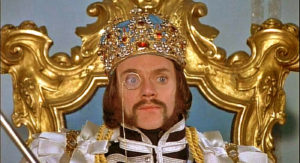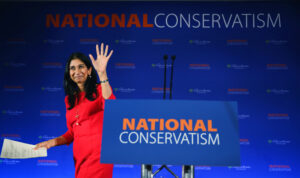One day in the late Twenties, during his second spell as Prime Minister of the greatest imperial power on the planet, Stanley Baldwin fell into conversation with a stranger on a train. A stocky, pleasant-looking man in a tweed three-piece suit, the very picture of middle-class ordinariness, Baldwin had never been very gregarious. Perhaps, as the train pulled out of the station, he was already poring over his government papers. Perhaps he had buried himself in a volume of his beloved Wordsworth, or in one of his cousin Rudyard Kipling’s short stories. Perhaps he was sitting back, eyes closed, dreaming of his native Worcestershire. Or perhaps he was frowning over The Times crossword, pen in hand, as he sometimes did in the Commons when a debate was dragging on.
Then his neighbour in the first-class carriage leaned over and tapped him on the knee. “You are Baldwin, aren’t you?” the man said. “You were at Harrow in ’84.”
The Prime Minister nodded. The man sat back, satisfied. Then, a minute or so later, the man leaned forward and tapped him on the knee again. “Tell me,” he said affably, “what are you doing now?”
Even if that story isn’t true — and if it is, it could only have come from one person — it tells you something about the modest man who first became Prime Minister on 22 May 1923, exactly 100 years ago.
In many ways, Stanley Baldwin dominated the first half of the 20th century. He was Prime Minister three times in the Twenties and Thirties, for a total of more than seven years, and co-ran the country alongside Ramsay MacDonald for four more. He was the first mass-media premier, with a grasp of radio unmatched by his contemporaries, and appealed to a new, genuinely democratic electorate, including women as well as men. He stood for democracy in the age of the dictators, and steered his country through the General Strike, the Depression and the Abdication. And he weathered the storms of office to step down in 1937 at a moment of his own choosing, admired and respected even by his opponents.
That Baldwin is barely remembered today, then, could hardly be more unjust. His reputation took a crippling blow when he was traduced as one of the so-called Guilty Men, savaged in a thoroughly mendacious short book for his supposed appeasement of Nazi Germany. Even now some writers, foolishly parroting the clichés of the past, accuse him of sending Britain defenceless into the Second World War, even though Baldwin actually commissioned almost 100 new RAF squadrons in the teeth of fierce opposition from a near-pacifist Labour Party. And when he appears on television or in films, it is only as a dithering foil for the dynamic Churchill, never as the brilliantly canny operator who effectively invented modern Conservatism.
Yet whenever people lament the passing of an age of decent, serious, public-spirited politicians, they could be talking about Stanley Baldwin. In almost every respect, he was a walking rebuke to his modern-day successors. And what’s more, he was a far more interesting character than almost all of our current MPs put together.
Born in 1867, the son of a paternalistic Worcestershire industrialist, he did indeed go to Harrow, where he got into trouble for writing his own pornography — this was, of course, an age before teenagers were spoon-fed — and sending it to his cousin at Eton. This cast a serious blight over his schooldays, and young Stan hoped to make a fresh start at Cambridge.
But then — disaster! His old headmaster, who despised him, was appointed as Master of Trinity, Stan’s college. More misery. In the end, he graduated with a Third in history, having made virtually no impression on his contemporaries at all.
When he got back home to Worcestershire, his father Alfred — a stern and serious man — said grimly: “I hope you won’t get a Third in life.” Fortunately, he didn’t. Quite the opposite.
Baldwin didn’t inherit his father’s Bewdley constituency until he was nearly 41, having spent the intervening years working for the family iron-making firm. No doubt today he’d be mocked as a nepo baby. But like his father, Stanley was a deeply dutiful man, who prayed on his knees every night and took his Anglican faith enormously seriously.
Perhaps the best illustration of his sense of national responsibility was his letter to The Times on 24 June 1919. Baldwin, who was now Financial Secretary to the Treasury, noted that the country had run up colossal debts to pay for the Great War. This, he said, gave “the wealthy classes … an opportunity of service which can never recur … Let them impose upon themselves, each as he is able, a voluntary levy.”
For his part, he announced that he was giving up 20% of his fortune — a donation worth about £33 million today — to pay off the debt and relieve poor taxpayers of the burden. A nice gesture — but there was a twist. Baldwin didn’t sign his name: indeed, he made the editor of The Times promise not to tell anybody who had written the letter, because he didn’t want the attention. If you want to make your head ache, just try to imagine Matt Hancock doing that.
Even at that stage, nobody would have tipped Baldwin as a future PM. Compared with the man of the hour, the charismatic, flamboyant, monstrously priapic David Lloyd George, he seemed utterly ordinary. But Baldwin’s ordinariness — or his appearance of ordinariness, which isn’t the same thing at all — was his superpower. At the crucial meeting at the Carlton Club in October 1922, when the Tories decided to ditch Lloyd George and break up the wartime coalition, it was Baldwin’s voice that carried the day.
In private, Baldwin thought “the Goat”, with his taste for flogging peerages and interfering with other people’s wives, a “corrupter of public life”. And so, calmly, devastatingly, he plunged in the knife. Lloyd George, he told his colleagues, had once been called a “dynamic force”. But, said Baldwin, “a dynamic force is a very terrible thing; it may crush you”.
That was the end of Lloyd George — and the making of Baldwin. Less than a year later, after an election had smashed the Liberals and brought the Tories a crushing majority, George V invited him to become Prime Minister. Once again our hero stepped over the bleeding body of a flashier, louder rival — this time Lord Curzon, former viceroy of India, the most arrogant man on the planet. Curzon thought Baldwin a man “of the utmost insignificance”. When the King told him that he was picking Baldwin anyway, he burst into tears.
So, armed with his religious faith, his boringness and his Cambridge Third, Baldwin ascended to the highest office in the land. In reality, of course, he wasn’t boring at all. Time magazine called him “a perfect John Bull in physical and mental makeup”; but as any lecturer in beauty therapy will tell you, makeup takes work.
Baldwin’s background was in industry, but he was brilliant at playing the country yeoman. In his most famous speech, a paean to romantic nostalgia, he evoked “the sounds of England, the tinkle of hammer on anvil in the country smithy, the corncrake on a dewy morning, the sound of the scythe against the whetstone, and the sight of a plough team coming over the brow of a hill”.
All this was pure fantasy. The sounds of Baldwin’s England were record players, radios, motorbikes and vacuum cleaners. They were motor cars chugging through suburban estates, builders hammering away at Tudorbethan semis. But as he realised, if only unconsciously, middle-class suburban modernity came with a deep longing for what had been lost.
Baldwin offered his voters stability, rootedness, a sense of tradition. Watch one of his YouTube clips — my favourite is this tremendously endearing speech at a retirement home for elderly actors — and it’s hard not to feel immediately reassured. He seems the very embodiment of old England. But of course the whole thing is a performance — and given the medium, a very modern one.
To some of his better-remembered contemporaries, Baldwin’s success was utterly baffling. Churchill, when playing chess, would gesture at his opponent’s pawns with the words: “Bring out your Baldwins.” Orwell said that he was “simply a hole in the air”. They were both wrong. Voters in the Twenties and Thirties understandably shrank from the reckless, belligerent adventurism that had sacrificed so many lives at Gallipoli. Most voters were more like Bilbo Baggins, the very personification of Baldwin’s England, who made his first appearance during the great man’s final months in office. “We are plain quiet folk and have no use for adventures. Nasty disturbing uncomfortable things! Make you late for dinner!”
As for being a hole in the air, that too was all part of the performance. Baldwin’s appeals to unflashy common sense were a brilliant way of presenting the Conservatives as the sensible, unthreatening, alternative to Labour’s supposed crypto-Bolshevism. And in reality, he was a much more nervous, restless figure than people realised. Colleagues watching him on the front bench noticed how he would twitch and fidget with nerves, exhibiting tics you can still detect on YouTube today. His oddest quirk was his habit of picking up books, lifting them to his face and sniffing them, which has never been properly explained. Some strange Harrovian fetish?
A century on, then, Baldwin ought to be much better known. To academic historians like his biographer Stuart Ball, his accomplishments are obvious. In an age of seething political turbulence, he turned the Tories into the dominant party of government, enlisting working-class and middle-class voters beneath the banners of common sense. His affable, consensual style meant Britain entered the late Thirties as a relatively contented, cohesive country — especially when compared with future allies such as France and the United States, let alone Germany and Italy. There will always be questions about the pace of rearmament. But Baldwin’s contribution to victory was arguably deeper and more important. Thanks to him, Britain entered the war united — perhaps the greatest asset of all.
Today people love to judge our predecessors according to our own moral and cultural standards – and here Baldwin also comes out remarkably well. His eldest son Oliver, traumatised by his experiences in the trenches, became a Left-wing Labour MP, opposed to everything his father believed in. Stanley confessed to his daughter that he “nearly died” when he first saw Oliver glaring at him from the Opposition benches. But he was not a man to hold a grudge; father and son were reconciled eventually, and their letters make for deeply moving reading.
And there’s something more. Oliver wasn’t just a socialist; he was gay. Some Conservative MPs would have had a stroke at the very thought, and Stanley’s cousin Rudyard Kipling was so appalled by such “beastliness” that he severed all relations with his nephew. But Baldwin remained the ever-loving father. Whatever his personal convictions, he accepted his son’s partner, John Boyle, as part of the family, and would often drive over to visit them at their Oxfordshire farmhouse. If he ever murmured the slightest syllable of criticism, there’s no sign of it.
So perhaps the last word should go to Oliver, whose memoir of his father’s final days in December 1947 is reprinted in Philip Williamson’s wonderful collection of Baldwin’s letters. “He died as he would have wished,” Oliver wrote, “peacefully in bed. No bed-clothes were ruffled, no attempt made to ring a bell or turn on a light.”
That was entirely in character, and perhaps that’s why he’s barely remembered today. But Stanley Baldwin deserves better. He wasn’t just a great politician. He was a great man.
Disclaimer
Some of the posts we share are controversial and we do not necessarily agree with them in the whole extend. Sometimes we agree with the content or part of it but we do not agree with the narration or language. Nevertheless we find them somehow interesting, valuable and/or informative or we share them, because we strongly believe in freedom of speech, free press and journalism. We strongly encourage you to have a critical approach to all the content, do your own research and analysis to build your own opinion.
We would be glad to have your feedback.
Source: UnHerd Read the original article here: https://unherd.com/






